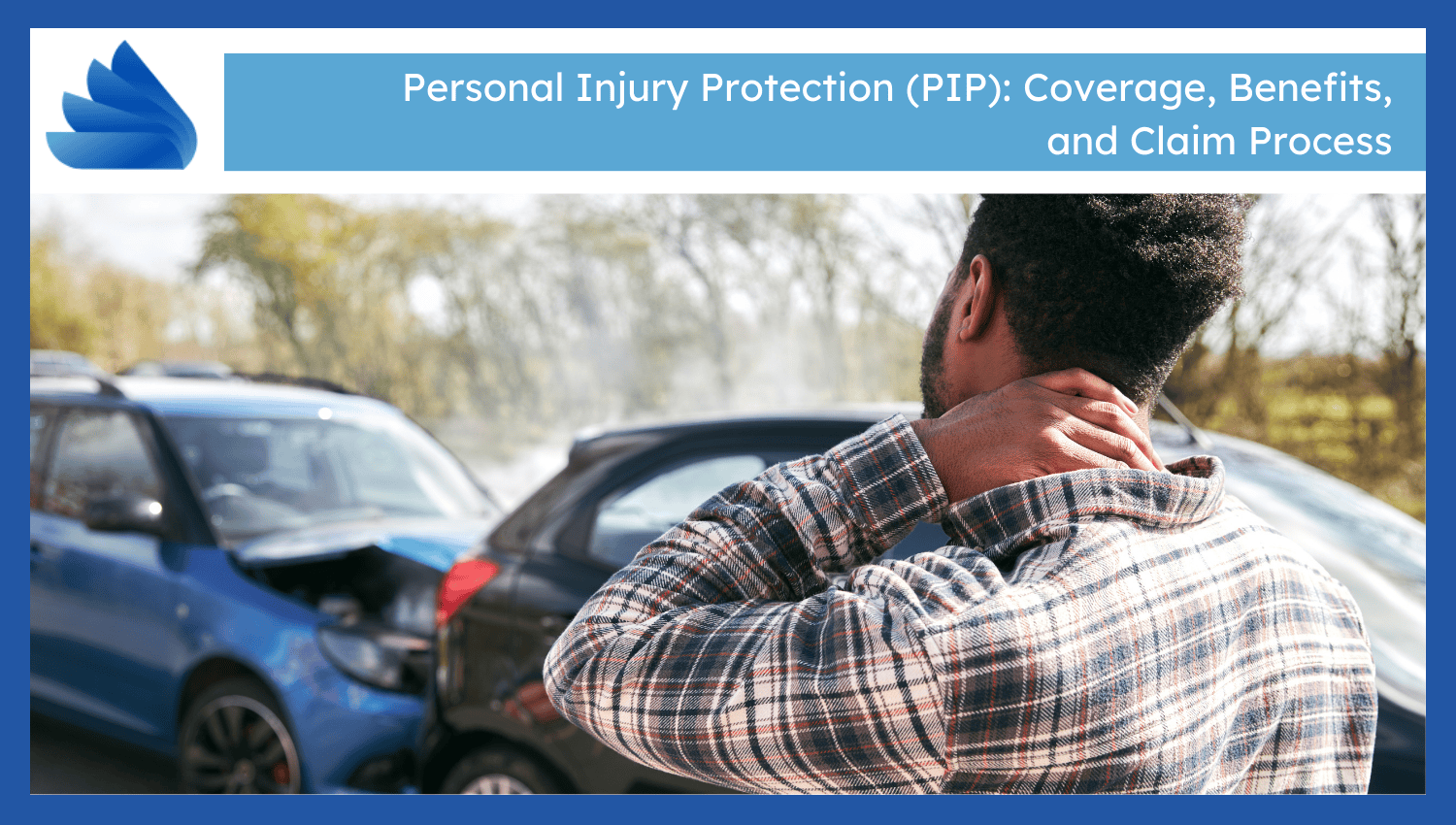
Personal Injury Protection (PIP): Coverage, Benefits, and Claim Process
Personal Injury Protection (PIP) is a no-fault auto insurance policy, which covers medical bills when a car accident takes place. It assists in paying hospital expenses, physician charges, and surgical expenses, irrespective of responsibility.
The main aim of PIP is to cover accident related personal injury financially on the spot. The Insurance Information Institute (2023) further explains that PIP is an option in no-fault states and it can also cover essential services and lost wages. There are states such as Florida, which mandates a minimum PIP coverage of $10,000. This also prevents people from going through finances to treat accidents.
PIP benefits play an important role to help individuals with poor health cover or limited recovery periods as a result of car accidents.
How Does PIP Work?
Here are the six step working of Personal Injury Protection (PIP)- Claim Process: To make a PIP claim, notify your insurer about the accident. Submit hospital records, bills and accident details. Once your claim is examined, the insurer pays the healthcare providers or reimburses you.
- No-Fault Basis: PIP is applicable irrespective of the party at fault. Your PIP coverage covers your medical expenses and other related costs regardless of who is responsible whether yourself or another driver. No-fault acts make the claim process easy and minimize disputes.
- Liaison with Health Insurance: PIP is compatible with your health insurance. Health insurance actives when your medical expenses are beyond the PIP coverage levels. Nevertheless, your health insurance company can expect you to repay them in case it covers your PIP expenses.
- Proof & Documentation: Process PIP claim by submitting medical records, medical bills, accident reports and occasionally, witness statements. To prove your damages, insurers require undisputed evidence about your injuries and costs to treat them. Claims are delayed because of incomplete records.
- Deadlines to file: States have time limitations on making a claim to PIP and aim for a limit between 30 and 60 days after the accident. Not complying with time limits are subject to claim rejection. Examine the law of your state to ensure to file your claim on time.
- Payment Distribution: PIP benefits are applied to medical expenses, lost wages, essential services, and funerals. Your health providers receive direct payments or reimburse you. Each category has its coverage limits that are different depending on the states.
What Does PIP Cover?
Here are the five expenses RIP cover:- Medical Expenses: PIP includes basic costs of hospitals, doctors visit, surgery and medication expenses in consequence of accident. This comprises follow-up and emergency room treatments. Medical expense coverage needs at least $50,000 of PIP in states, such as New York.
- Lost Wages: PIP pays lost wages when you are not able to work due to injuries. Coverage usually covers up to 80 percent of your wage with state restrictions. It provides maximum coverage of up to 10000 in the state of Florida.
- Rehabilitation Costs: PIP includes physical therapy, rehabilitation and recovery programs which are essential in the healing process. This consists of chiropractic or special therapy. Coverage ranges can reach 80 per cent of treatment costs and vary according to state regulations.
- Funeral Expenses: PIP covers funeral expenses in fatal accidents. The benefits cover burial and cremation charges. PIP covers funeral expenses of up to 11,000 dollars in Michigan to families that have lost a loved one in a crash.
- Household Services: PIP is also used to pay people to help out with chores around the house, or child care, in case your injuries make such activities impossible. This makes sure that day to day work is taken care of as you heal the pains.
How to Choose the Right PIP Coverage?
Here are the five ways to choose right Personal Injury Protection (PIP):- Coverage Limits: When buying a PIP coverage, make sure to use a limit that is proportional to all the probable medical and recovery expenses. Other states such as Michigan need even 50 000 dollars but greater sums can be more effective in worst accidents.
- Benefits vs. Premiums: Compare premium prices to the extent of coverage. Greater premium results in more comprehensive benefits, whereas lower premiums restrict them. Consider the overall expenditures against benefits to have a reasonable defense without paying too much.
- State Requirements: The minimum PIP coverage varies according to each state. As an example, Florida requires at least 10,000 dollars coverage. It is important to always consult the laws of your state to address the necessary levels which can affect your premiums and benefits.
- Add-Ons: It is worth considering more covering options, like wage loss or household help. These options can enhance your coverage and likewise boost premiums. Balance affordability and possible advantage to make your choice.
- Insurer Reputation: Check the reputation of your insurer with regard to claim managing and customer service. Seek out reviews of the speed of claim settlement, communicativeness and customer service. A credible insurer, such as State Farm or GEICO, makes claims even easier and faster to reimburse.
Who Needs PIP Coverage?
Here are the three groups who needs Personal Injury Protection (PIP):- Drivers in No-Fault States: PIP is compulsory to drivers in no-fault states such as Florida and Michigan. Such states have a minimum coverage in an attempt to go that far to make sure that drivers have access to medical treatment and lost wages, irrespective of whose fault the cause of the accident is.
- High-Commute Drivers: PIP is beneficial to drivers who commute extensively or have exposure to high traffic risks. The longer one drives, the higher the risk of accidents, thus PIP can serve as a good protection against lost earnings and medical costs.
- Families: PIP protects passengers, house members, as well as the driver. When a family member becomes involved in an accident, PIP provides medical expenses, wages and other expenses incurred as a result of the accident.

